|
|
|
Sort Order |
|
|
|
Items / Page
|
|
|
|
|
|
|
| Srl | Item |
| 1 |
ID:
139308


|
|
|
|
|
| Summary/Abstract |
It would be difficult to find a republican system in the Middle East today where Islamic legal scholars are as present in public life as they are in Yemen. In the southern tip of the Arabian Peninsula, ulama hold offices in the judiciary, the educational system, and the cultural sector. To date, they have been represented in both chambers of the bicameral system and in every cabinet since the unification of Yemen in 1990. With few exceptions, they also count among high-ranking members of the country’s most influential parties. During the uprising in 2011, ulama attended public squares across the country every Friday to hold sermons in favour of, or against, the demands of the protesters.
|
|
|
|
|
|
|
|
|
|
|
|
|
|
|
|
| 2 |
ID:
139313
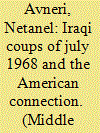

|
|
|
|
|
| Summary/Abstract |
After the June 1967 war, Iraqi President ’Abd al-Rahman ’Arif and Prime Minister Tahir Yahya broke diplomatic relations with Washington and began signing strategic economic agreements for oil development with France and the Soviet Union. On 17 July 1968 their regime was toppled by a coup initiated by members of the Baʽth Party and a group of military officers. Just 13 days later in another coup initiated by the Baʽth, the officer leadership was deposed. This article examines Washington's reaction to the two coups and the indications of the western orientation of the short-lived regime that ended on 30 July. It also reveals findings that support the claim of American involvement in the overthrow of ’Arif.
|
|
|
|
|
|
|
|
|
|
|
|
|
|
|
|
| 3 |
ID:
139312


|
|
|
|
|
| Summary/Abstract |
This article discusses the Israeli-Syrian Disengagement negotiations following the October 1973 war. Both sides' intransigence in linking the POW issue to other issues prevented the beginning of negotiations, an impasse skillfully resolved by US Secretary of State, Henry Kissinger. Throughout the negotiations he succeeded in persuading both sides to soften their positions, especially during his May 1974 shuttle between Jerusalem and Damascus. The Disengagement agreement signed on 31 May 1974 was implemented by June 26.
|
|
|
|
|
|
|
|
|
|
|
|
|
|
|
|
| 4 |
ID:
139310
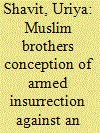

|
|
|
|
|
| Summary/Abstract |
The article analyzes the opinions of the intellectual and political luminaries of the Muslim Brothers from the 1930s to the late 1990s on launching an armed insurrection against an unjust Muslim regime. An examination of works by Hasan al-Banna, Hasan al-Hudaybi, ‘Umar al-Tilmisani, Muhammad Qutb, Yusuf al-Qaradawi and Ma'mun al-Hudaybi reveals that, in addressing different types of challenges, the mainstream of the movement developed a broad and consistent consensus on the matter that draws from classic Islamic jurisprudence. According to this consensus, violence can be applied only as a last resort and only following an application of ‘fiqh al-muwazanat’ (the jurisprudence of balances) that indicates that success is certain, and that the harm caused in the process would not be greater than the benefit incurred. How a specific regime came to power, and the level of injustice it commits, are irrelevant criteria; a decision on launching a violent revolution is primarily concerned with pragmatically assessing opportunities and consequences.
|
|
|
|
|
|
|
|
|
|
|
|
|
|
|
|
| 5 |
ID:
139307
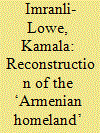

|
|
|
|
|
| Summary/Abstract |
The notion of the ‘ethnic’ or ‘historical’ homeland, as it crystallized in the nineteenth century, played an important role in the development of nationalist activists’ arguments about nation-states, whose creation they strove to achieve. The Armenian revolutionary movement of the last decades of the nineteenth century brought the issue of an ‘Armenian homeland’ to the fore.
|
|
|
|
|
|
|
|
|
|
|
|
|
|
|
|
| 6 |
ID:
139309
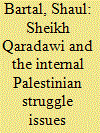

|
|
|
|
|
| Summary/Abstract |
Sheikh Dr Yusuf al-Qaradawi is one of the most influential Muslim thinkers in the world. Western observers consider him a moderate, a bridge between Muslim conservatives and Islamic activists. This article, through direct translation of Sheikh al-Qaradawi's verbal and written expressions, shows the view of him as a moderate to be wishful thinking when it deals with the Palestinian problem. This article deals with issues preventing reconciliation between Fatah and Hamas and the influence of the Qaradawi era over the struggle between the organizations.
|
|
|
|
|
|
|
|
|
|
|
|
|
|
|
|
| 7 |
ID:
139311


|
|
|
|
|
| Summary/Abstract |
During the period of the Justice and Development Party (JDP), the longest uninterrupted ruling party in the history of modern Turkey (except for a period of single-party rule during the early Republican era), not only a new political regime but also a new labour regime has been established. Following the 12 September 1980 coup d’état, and during the time of Premier Turgut Özal (1983–91), precarious and flexible labour practices started up that were convenient for the government and employers, but disadvantageous to workers. The JDP institutionalized these practices in the early years of the twenty-first century.
|
|
|
|
|
|
|
|
|
|
|
|
|
|
|
|
| 8 |
ID:
139306
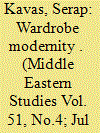

|
|
|
|
|
| Summary/Abstract |
To a social thinker who is used to dealing with macro aspects of sociopolitical phenomena,
the issue of clothing may sound trifling, or at best may be viewed as an insignificant detail of social life and thus be discounted as secondary. However, what are considered mundane issues may themselves be so heavily loaded and may bear such subtle and unique meanings that inattention to them may result in missing some very important insights allowing a much closer analysis of larger issues, such as the experience of modernization, in particular, in a non-western context. As Comaroff and Comaroff rightly put it, ‘Cultural revolutions usually rooted themselves on modest terrain, in simple acts of fabrication, use, exchange. Even the most elaborate social formations arise from such quotidian acts’.
|
|
|
|
|
|
|
|
|
|
|
|
|
|
|
|
|
|
|
|
|